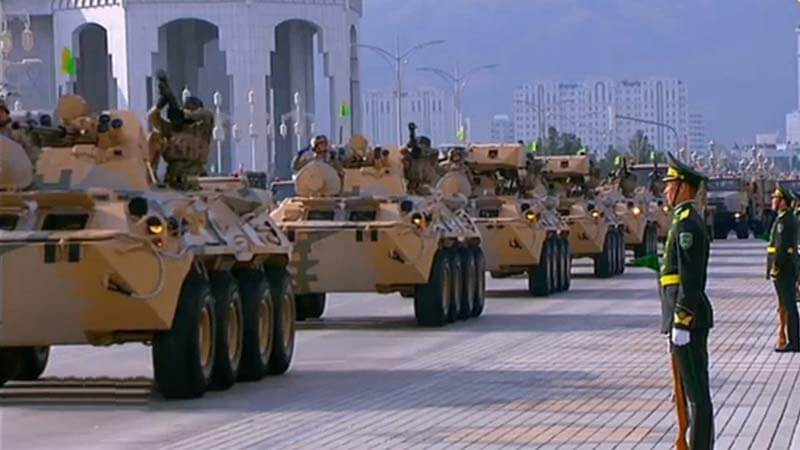Turkmenistan turned 26 years old on Friday, marking over a quarter of a century since it adopted the law entitled "About Independence and Bases of a State System of Turkmenistan," on October 27, 1991, That day has since been considered the modern state’s day of independence, and is celebrated annually.
“Twenty six years ago, with the declaration of independence, the foundation of a democratic, legal and secular state, political, economic and cultural development of our Motherland was laid,” Turkmenistan’s President Berdimuhamedow said in a congratulatory message on Friday.
Home to over 5.3 million people, the country held two days of cultural events, from October 27-28, to commemorate its independence from the Soviet Union. In the lead-up to the festivities, Berdimuhamedow, keeping with annual tradition, present awards to outstanding Turkmenistanis representing various sectors of the economy, and pardoned 1,636 convicts.
Colorful street processions accompanied a military parade, and included representatives from all five regions of the Caspian region country.
Berdimuhamedow’s keynote speech highlighted Turkmenistan’s economic achievements, including those in the oil and gas industry and upon which the economy is heavily reliant. Hydrocarbon exports, mostly in the form of natural gas headed for China, make up 25 percent of revenues collected by Ashgabat.
Turkmenistan sits atop the world’s sixth largest proved natural gas reserves, putting it behind giants like Russia, Iran, Qatar, the U.S., and Saudi Arabia, according to 2016 estimates by the U.S. government. Some analysts put the country’s total reserves at 50 trillion cubic meters (tcm), however, far above the proved reserves figure of 7.504 tcm.
According to Akhmat Imanov, who heads the Center on International Policy and Economy in Tashkent, Uzbekistan, Turkmenistan’s economy has been hard-hit in recent times. In 2014, Turkmenistan’s GDP real growth rate was 10.4 percent, and has decreased each year since. In 2016, the rate was 6.2 percent, according to U.S. government data.
"Ashgabat urgently needs the realization of the TAPI gas pipeline,” Imanov said, referring to the 1,814 km (1,127 mi) Turkmenistan-Afghanistan-Pakistan-India pipeline that will allow Ashgabat to diversify the country’s natural gas export market, which is currently monopolized by China. TAPI will have a capacity of about 33 billion cubic meters, and cost about $10 billion. While it has been beset with setbacks, stakeholders are hopeful the project will go online in 2020.
“Turkmenistan needs new customers as soon as possible,” Imanov said.







 President Ilham Aliyev shed light on the evolving contours of the peace process with Armenia during an international conference in Baku this week. ...
President Ilham Aliyev shed light on the evolving contours of the peace process with Armenia during an international conference in Baku this week. ...
 Azerbaijan and Armenia started the process of demarcation of their border on Tuesday, with the installation of the first border markers based on ge...
Azerbaijan and Armenia started the process of demarcation of their border on Tuesday, with the installation of the first border markers based on ge...
 Armenian sappers commenced on Monday mine-clearance operations in the territories adjacent to the Saint Mary Church in village of Voskepar (Armenia...
Armenian sappers commenced on Monday mine-clearance operations in the territories adjacent to the Saint Mary Church in village of Voskepar (Armenia...
 Iran and Pakistan have signed eight cooperation documents in various fields, and agreed to strengthen ties to fight terrorism in the region.
Iran and Pakistan have signed eight cooperation documents in various fields, and agreed to strengthen ties to fight terrorism in the region.
 As the conflict between Ukraine and Russia escalates, the strategic importance of Kharkiv, Ukraine's second-largest city, has come sharply into focus.
As the conflict between Ukraine and Russia escalates, the strategic importance of Kharkiv, Ukraine's second-largest city, has come sharply into focus.
 President Aliyev emphasized the critical role of the North-South Transport Corridor in fostering transport cooperation between Azerbaijan and Russi...
President Aliyev emphasized the critical role of the North-South Transport Corridor in fostering transport cooperation between Azerbaijan and Russi...



